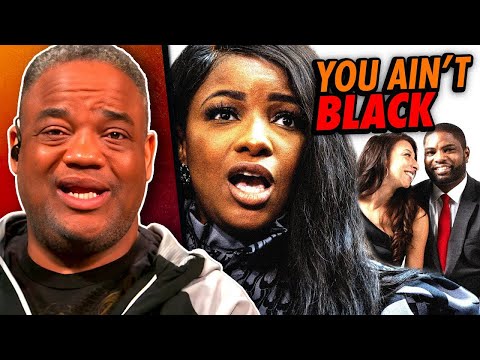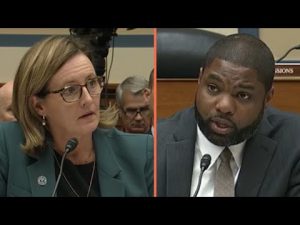### The Curious Case of Jasmine Crockett and Byron Donalds: A Modern Political Drama
In the ever-evolving landscape of American politics, it seems every day brings new revelations and interesting exchanges that leave citizens scratching their heads. One such exchange recently unfolded when Democratic Representative Jasmine Crockett decided to weigh in on Republican Congressman Byron Donalds and his marriage to a white woman. It was a comments section-worthy moment that has left many pondering the double standards that seem to plague discussions about race and relationships in today’s political arena.
Crockett’s comments implied that Donalds’ marriage somehow made him less legitimate or “whitewashed.” The underlying premise seemed to suggest that because he is married to a white woman, his perspective on race and history might be compromised. This raised eyebrows not just because of the insinuation itself, but also because it starkly contrasts with the left’s usual stance on inclusivity and acceptance. Isn’t it fascinating that a representative of a party that prides itself on diversity would hurl such an outdated criticism? It appears that when it comes to political discourse, the left has some peculiar rules.
Now, one might wonder: how does Crockett reconcile her criticisms of Donalds with her silence toward other prominent Democrats who have also chosen partners outside of their race? For example, Vice President Kamala Harris and Supreme Court Justice Ketanji Brown Jackson both have Jewish husbands, yet they seem to escape scrutiny similar to that faced by Donalds. It’s like a game of political dodgeball, where only certain players get hit. This inconsistency raises questions about whether the criticism is based on genuine concerns about race relations or if it’s rooted in an agenda that prioritizes conformity to party lines over authentic discussion.
Moreover, much of the backlash against Donalds seems to stem not just from his marriage, but from his willingness to break away from the traditional narrative often promoted by the left. By suggesting in a recent discussion that life had aspects that were better under Jim Crow—a statement that was likely taken out of context—Donald’s reflections on history triggered a predictable outrage. It appears that for some on the left, the accepted narrative must remain unchallenged, and any deviation from that is met with personal attacks rather than respectful debate.
The apparent double standards don’t stop with marriage and historical perspectives. The broader conversation about men’s roles within relationships and households has also taken a peculiar turn. Critics point out that many on the left rally behind a feminist message that often undermines traditional family values. This wave of feminism, it seems, has left some black men feeling that they cannot find the supportive partners they desire within their communities. Ironically, this creates a dynamic where men like Donalds may seek partnerships elsewhere, not simply by preference but as a reflection of their circumstances.
In conclusion, the exchange between Crockett and Donalds underscores a larger dilemma within contemporary politics. As both sides delve deeper into identity politics, the criteria for acceptance seem to sway unpredictably. Political narratives, grounded in emotional rhetoric rather than clear logic, make it sound as if the ultimate goal is not dialogue, but rather to performatively uphold certain attitudes about race and relationships. As viewers continue to witness such back-and-forths, they are left pondering whether clarity and reason will ever take precedence in political discussions. It just goes to show that in the world of politics, the lines between rhetoric and reality are often blurred, creating a spectacle that leaves everyday people both entertained and baffled.



